Reviews
Don McKellar
Canada, 1988
Credits
Review by Adam Balz
Posted on 23 August 2013
Source iTunes rental
Categories Favorites: The Apocalypse
At the end of Norman Rockwell Is Bleading, comedian Christopher Titus makes an astute observation about how certain portions of our population might react to the end of the world:
The Los Angeles Times reported that 63% of American families are now considered dysfunctional. Good. ‘Cause that means when Armageddon really happens, 37% of this population is going to lose their mind… Us 63%, we’re gonna go, ‘Hey, there’s nobody watching the Lexus dealership! We’re going to the apocalypse with leather and a CD player!’
It’s an interesting notion, one made all the more personal by Titus’ own biography, which precedes these closing remarks in an act that is more self-effacing monologue than actual stand-up routine.
Regardless of the platform, however, there is something to be said for Titus’ idea that not everyone may react in the same way toward the end of the world. Films concerned with the apocalypse tend to depict human civilization descending into a mass hysteria marked by unchecked violence and looting, arson, crowded houses of worship, toppled governments, and ritual mass suicide. Pure anarchy, essentially—a bloodthirsty and lawless tide that our protagonists are chanced with navigating. But is that really how it would happen? Just as those cinematic depictions frame human beings as one apocalyptic diagnosis away from ethical devolution, they also frequently include outliers—men and women who are aware of the events taking place but are also at peace with it, in their own specific ways. Frequently they are homeless or wearing sandwich-boards—those who were isolated from society long before there was any hint that society would end.
Titus’s punchline postulates the opposite: the outliers are not those who are calm in the face of End Times but those who aren’t; that those whose various stabilities - mental, emotional, spiritual - are shaken away at the prospect of a cosmic expiration date are in fact the minority, and most people would find an element of peace and routine, even practicality, in armageddon. It’s this dichotomy that is at the heart of Don McKellar’s Last Night, a small-budget film from the late 90s that defies almost every convention associated with apocalypse films. Yes, the world’s end rattles society - or, in this case, a few city blocks in Toronto, where the film is exclusively set - but the people are rattled only slightly. A handful of citizens still go to work - a newscaster, a gas-company executive and his most loyal employee - while others reschedule certain important events to maintain a sense of normalcy and routine. A widower named Patrick, who we first meet upside down on his living room floor - a perfect metaphor for the new world in which he now lives - spends a part of his last day celebrating an early Christmas with his family, where a full dinner is served and nostalgic keepsakes are given as presents by his mother. At the same time, a woman named Sandra stops at a local supermarket and, scouring the bare shelves, finds a bottle of wine and some food for a dinner with her husband, while another woman - Donna - reveals to her boss that she’s been filling her daily cup of juice with alcohol. At this point, there are only a few hours left before everything is extinguished at midnight, and the sun over Toronto is as bright as ever.
There are hints that the sun is responsible for the coming apocalypse long before the actual diagnosis is spoken - it is late at night and yet bright outside, cell phones stopped working weeks before, and so on - but the cause is of little consequence to the featured characters, who continue on with their lives, for good and bad, as best they can. Sandra tries to get home without her car, which has been vandalized and stuck vertical against a telephone pole, until she meets up with Patrick, who agrees to escort her across the city in search of a replacement; eventually, they wind up at the apartment of Craig, an old friend of Patrick’s who has decided to use his few remaining months to satisfy every sexual curiosity he has. After grudgingly giving up one of his three vehicles for Sandra’s use, Craig reveals his plans to Patrick, which he’s listed on every available surface in his small kitchen. The entire adventure has taken two months or so, he confesses, and he’s just about done.
There are other revelations as midnight approaches. Across town, Donna drinks a little more of her alcoholic juice than usual and, in a rare moment of anger, lashes out at her boss - who has left her to maintain the gas company alone - by attacking his well-kept desk before embarking on an adventure of her own. Two of Patrick’s elder aunts sit watching old home movies until, disgusted, one of them delivers an earnest and strangely moving diatribe against younger generations:
I don’t give a damn. People are always saying ‘The children. Pity the children.’ I’m tired of the children. They haven’t lived, given birth, watched their friends die. I have invested 80 years in this life. The children don’t know what they’re missing.
And Sandra, returning to Patrick’s apartment without success, reveals her own plans to him, finally divulging the contents of the small briefcase she has been carrying around: just before midnight, she and her husband were planning on killing one another to retain some level of control over their destinies, and she has two pristine handguns to prove it. Tearfully, she asks Patrick if he would be willing to kill her instead, now that her husband has left her to fend for herself.
These plans are extreme in their own way, especially Sandra’s suicide pact with her husband, though they are from from the nihilistic revolutions of other apocalypse films. In fact, they are almost quaint in their personal simplicity, and the most radical plans we see throughout the entirety of McKellar’s film involves the fate of Donna’s boss, whose ice-cream dinner is interrupted by a man with a shotgun; otherwise, there are no mass demonstrations, no cities burning, no societal upheavals. And all of these have been a possibility for well over two months—an unendurable eternity for the billions of people who know their lives will not last much longer. Each of us, McKellar seems to be saying, deals with the world’s end not by joining together as one to seek comfort in pandemonium but by separating from others and disappearing into our own personal anarchies, where discomfort can be ignored.
At first it seems as though Patrick is the only character who is able to rise above these impulses, moving stone-faced through the entire ordeal, even as his own plans for midnight are constantly interrupted. He wants to sit on a roof outside his apartment, play classical music, and let the end happen naturally, and on the outset this seems like a mature recognition of the inevitability of fate. He does not descend into sex, vandalism, self-destruction, anger, or delusion. It’s only in the film’s closing minutes, as he contemplates carrying out Sandra’s request and attempts to make himself less of a stranger to her - “Tell me something to make me love you,” she says - that he reveals his own pain. His wife died of cancer years before, and even now his apartment is filled with memories of her, including finger-paintings done by her students while she was in the hospital. Death, we now understand, will end his pain and bring him and his wife back together, if not in a religious afterlife than at least in the shared connections of a premature death. In Patrick’s chaos, not making a fuss over the coming end is his act of rebellion, as it opens the door to exorcising a more personal demon.
The only character who seems above all of this - a man without his own representative turmoil - is Menzies, another of Patrick’s old friends, who appears only infrequently but gives the disappearing hours a calming depth. Finding the music halls around Toronto suddenly empty, he schedules a long-awaited piano recital and hands out tickets to those he sees. Appearing on stage in a tuxedo two sizes too big - the only one he could find on such short notice - his amateurish recitations are intercut with the film’s closing moments. In attendance are a dozen or so people who have no obligation to attend but are there anyway, seeking perhaps one last hour of peace and culture before it all evaporates, and in those moments there is no outside world, no context, only an imperfect man and his piano.
There’s an old and tired thought experiment that poses this question: If you knew when you were going to die, what would you do? The answers vary and are supposed to reveal something important about the questionee’s character - spending time with family versus robbing a bank, say, or quitting a hated job versus retaining a routine to remain emotionally stable - but more often than not the answers are flat and unworthy of such a serious subject. We as people cannot seriously answer a question like that without understanding all the implications that come with knowing a precise date of death, and any attempts to make light of the issue are just a defense mechanism to keep us at arm’s-length from thinking about our own mortality. The world of McKellar’s Last Night is one in which death cannot be avoided, and it’s up to those living in it must decide how they’ll live with that knowledge. There is no widespread lawlessness, nothing close to other depictions of armageddon, but there is unrest—a soft, restrained discord that exists from one person to another but goes unspoken, lest the characters find themselves connecting with those who will soon be gone.
More Favorites: The Apocalypse
-
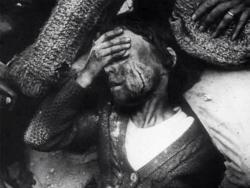
The War Game
1965 -
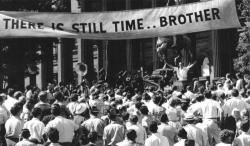
On The Beach
1959 -
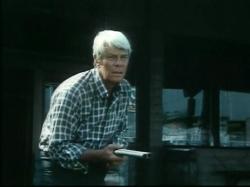
Where Have All the People Gone
1974 -

A Boy and His Dog
1975 -
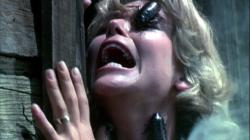
Bug
1975 -
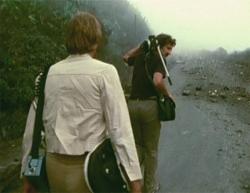
La Soufrière
1977 -

Escape from New York
1981 -

The Road Warrior
1981 -

Le Dernier Combat
1983 -

Night of the Comet
1984 -

Threads
1984 -

The Terminator
1984 -

Def-Con 4
1984 -
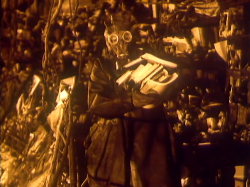
Letters From a Dead Man
1986 -
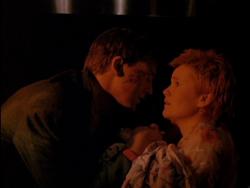
Miracle Mile
1988 -
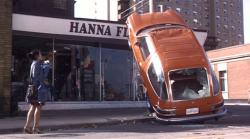
Last Night
1988 -

Last Days
2005 -

The Rapture
1991 -

Southland Tales
2006 -

Idiocracy
2006 -

The Happening
2008 -

The Road
2009 -

Cosmopolis
2012
We don’t do comments anymore, but you may contact us here or find us on Twitter or Facebook.



